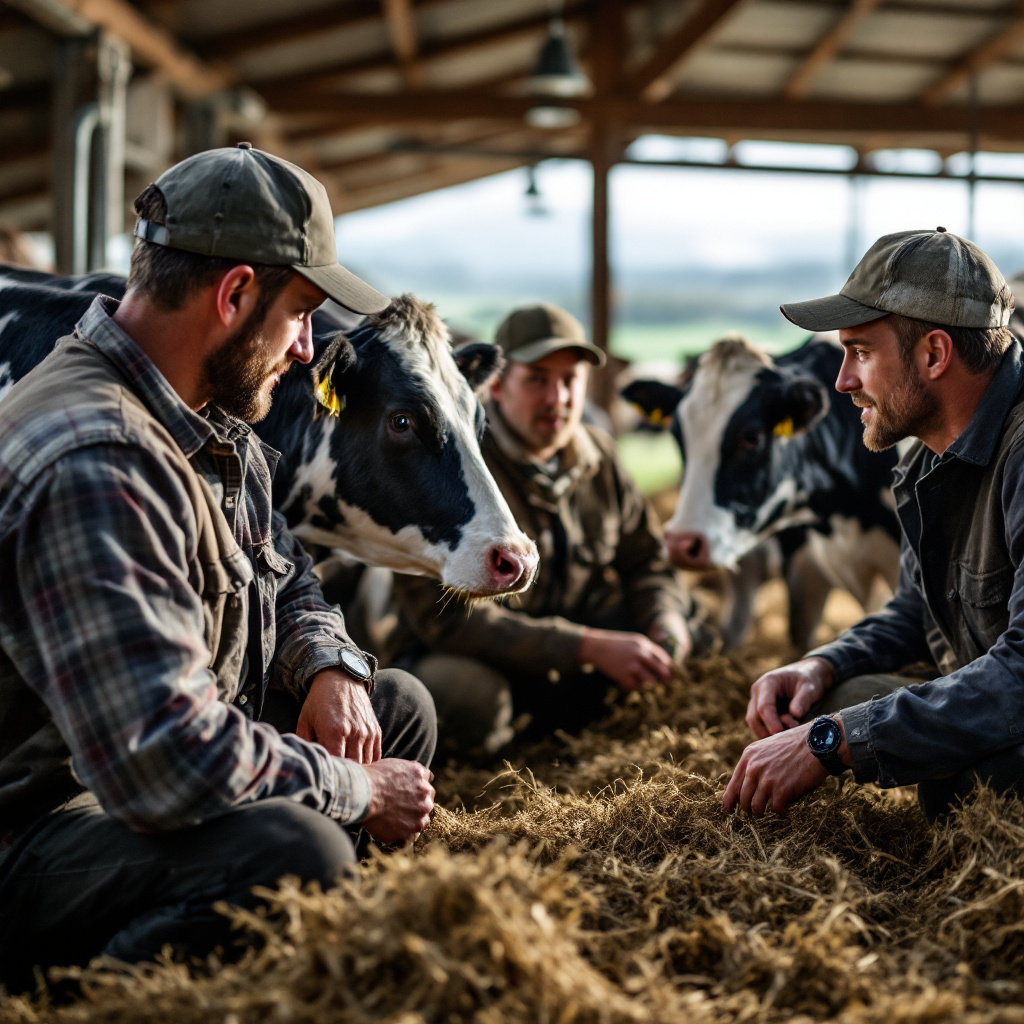Discover the top 5 teamwork secrets every dairy farmer needs to know. Ready to boost your farm’s productivity and harmony? Dive into these essential tips.
Summary:
Do you struggle to unite your dairy farm team despite having all the resources to be successful? You’re not alone. Based on insights from Patrick Lencioni’s “The Five Dysfunctions of a Team,” many leaders grapple with the same issues. This book offers a robust model to help you build a cohesive, high-performing team, essential for anyone looking to streamline their operations—especially for a 50-year-old dairy farm owner. Effective teamwork on dairy farms can increase milk production by up to 20%. Trust is crucial, allowing team members to be open and communicative. Personality evaluations like the Myers-Briggs Type Indicator (MBTI) or the Enneagram can help develop this openness. Engaging in healthy conflict encourages innovation and responsibility. To promote open debate, create a safe environment, model behavior, use structured debates, and hold regular check-ins. Commitment is critical for dairy farm success, so leaders should reward those who contribute to the team’s objectives. Overcoming dysfunctions in a dairy farm requires a culture of openness, vulnerability, and mutual respect. Addressing these dysfunctions can result in significant business improvements and future success.
Key Takeaways:
- Insights from Patrick Lencioni’s “The Five Dysfunctions of a Team” can help build cohesive, high-performing dairy farm teams.
- Effective teamwork can increase dairy farm productivity by up to 20%.
- Trust is foundational, enabling team members to communicate openly.
- Tools like the Myers-Briggs Type Indicator (MBTI) or the Enneagram foster trust and openness.
- Engaging in healthy conflict leads to innovation and accountability.
- Creating a safe environment and modeling constructive behavior promotes open debate.
- Regular check-ins and structured debates help maintain team alignment.
- Commitment from team members is vital for achieving farm objectives.
- A culture of openness, vulnerability, and mutual respect is essential for overcoming team dysfunctions.
- Addressing team dysfunctions can lead to significant business improvements and set the stage for future success.

Effective teamwork on dairy farms may increase milk production by up to 20%. You may nod or scratch your head if you own a dairy farm. Why should you worry about collaboration on the farm? Consider this: a cohesive team is more than just a business cliché; it is the foundation of production, even in dairy farming. When everyone works together flawlessly, the cows are happy, the burden is reduced, and your farm flourishes.
You’re in luck if you’re wondering how to form such a harmonious team. We’re reading Patrick Lencioni’s brilliant book, The Five Dysfunctions of a Team. It’s jam-packed with practical suggestions to improve your farm’s collaboration, increase output, and streamline day-to-day operations. So why should you continue reading? Because the teachings in this book are not only for corporate boardrooms; they can transform how you and your team collaborate on the farm.
Why Trust is the Backbone of Effective Farm Operations
Trust among team members is not a luxury but a must when operating a dairy farm. Consider this: daily, you interact with live creatures, perishable items, and sophisticated technology. In such an atmosphere, your team must function like a well-oiled machine; trust is the lubricant that keeps everything moving smoothly. Miscommunications and blunders are annoying and expensive in the absence of confidence.
So, why is trust the foundation of successful teamwork? First, trust enables team members to be vulnerable with one another. This implies they’re more inclined to confess mistakes or misunderstandings. When team members can communicate openly and honestly, issues are detected and handled more rapidly. Without this degree of openness, little problems might escalate into significant setbacks. Personality evaluations like the Myers-Briggs Type Indicator (MBTI) or the Enneagram are excellent for developing openness. These tools provide insights into individual team members’ preferences and habits, allowing everyone to recognize and appreciate their coworkers’ strengths and eccentricities.
Another practical way is to undertake frequent team-building activities, such as discussing personal histories at meetings. Ask team members to provide information about their histories, such as where they grew up or a struggle they overcame. This simple practice may go a long way toward fostering community and trust. Remember that trust-building is a continuous process that requires persistent, real effort from all parties involved. However, the benefits—a cohesive, efficient, and resilient team—are well worth it.
Avoiding Conflict on a Dairy Farm Can Spell Trouble
Avoiding confrontation on a dairy farm might be problematic. Assume staff sees inefficiencies in milking but don’t refrain from speaking out to avoid conflict. What happens? Issues that may be readily resolved are disregarded, resulting in reduced milk yields, lost resources, and damage to your bottom line. Ignored disagreements escalate little difficulties into major, expensive issues.
Engaging in healthy conflict has excellent advantages. It encourages innovation since everyone feels free to express their thoughts. This openness contributes to discovering better solutions and more efficient working methods. Furthermore, it fosters ownership and responsibility, which are essential for a thriving agricultural operation. Working through differences improves connections and trust among team members, encouraging a collaborative attitude.
So, how do you encourage open debate and resolve disagreements? Here are some tips:
- Create a safe environment: Make it clear that everyone’s perspectives are essential and that constructive conflict is encouraged. This begins with you, the leader.
- Model the behavior: Demonstrate that it is OK to differ politely and that such conversations are necessary for making sound judgments.
- Use structured debates: Set up meetings to address particular concerns, ensuring that everyone has an opportunity to speak. If necessary, use a moderator.
- Encourage real-time permission: Let team members identify when someone avoids confrontation. Immediate response makes individuals feel more comfortable speaking up.
- Hold regular check-ins: Regular meetings allow for raising and debating current concerns. Follow up on previous disagreements to guarantee successful settlement.
Avoiding confrontation may seem a better option, but it is a short solution that might lead to long-term problems. Accept healthy disagreement; your farm will function more smoothly with a more involved, inventive, and cooperative staff.
The Power of Commitment: Turning Your Dairy Farm Into a Well-Oiled Machine
Commitment is essential on a dairy farm. When everyone is on the same page and dedicated, success ensues. But when there is a lack of dedication, things go wrong quickly. Having clear instructions, sound operations, and dissatisfied team members would be best. Milking schedules might be disrupted, feed supplies delayed, and overall output could suffer.
So, how do you get everyone on board? Here are some practical tips:
- Set Clear Goals: Ensure that everyone understands the final objective and their role in accomplishing it.
- Establish Deadlines: Set reasonable yet demanding deadlines to hold everyone responsible.
- Regular Check-Ins: Hold weekly or biweekly meetings to assess progress and align the team.
Setting clear objectives and expectations can help you establish a devoted team ready to face any obstacles on the farm.
The Backbone of Consistency: How Accountability Drives Dairy Farm Success
Accountability is essential for sustaining high standards and meeting long-term objectives on your dairy farm. With it, even the best-laid plans might succeed. When team members regularly hold each other responsible, it guarantees that everyone is doing their part and contributing to the overall success.
Setting clear expectations and objectives is the first step in creating an accountable culture. Public announcements of these aims might serve as a regular reminder of the team’s goals. Implementing frequent progress evaluations may help everyone stay on target. These evaluations do not have to be particularly formal; they may be fast check-ins that allow for resolving concerns before they become troublesome. Patrick Lencioni (2023) states that a lack of responsibility may negatively impact team cohesiveness and performance.
Another practical step is to build a peer-review mechanism. When team members understand their peers will assess them, they are more inclined to stick to their tasks. Peer pressure may be an effective motivator. By incorporating these principles into your everyday operations, you maintain high standards and create a workplace culture in which responsibility is a shared value, propelling your farm toward greater efficiency and profitability.
When Team Members Focus on Anything But the Group’s Goals: The Ultimate Dysfunction
The ultimate dysfunction occurs when team members concentrate on personal objectives rather than collective ones. Every team must focus on precise goals and results. Results are more than profit or revenue; they reflect a broader definition of team success.
Good companies define their aims. These goals influence near-term performance more than financial indicators alone. While profit is the ultimate goal, the measures done in between drive success.
What might distract a team from results? It’s usually about status, either team or individual.
- Team Status: For some, just being part of the team is enough. Achieving goals might seem desirable but not worth significant effort.
- Individual Status: Members should prioritize the team’s goals over their ambitions.
How to Keep Your Team Aligned with Shared Goals
Keeping everyone focused on the collective goals is critical. Here are some tips:
- Public Goals: Teams that declare their goals publicly tend to put in more effort to achieve them.
- Results-Based Rewards: Tying rewards to team goals ensures everyone stays focused on what truly matters.
Leaders have an important role in keeping this focus. If they value outcomes, so will the team. Leaders must maintain objectivity and reward only those who contribute to the team’s success.
The Bottom Line
We’ve looked closely into the five dysfunctions that may derail any team. These concepts provide the foundation of good cooperation, from building trust to accepting disagreement, making explicit promises, holding each other responsible, and concentrating on joint outcomes. Overcoming these dysfunctions entails cultivating a culture of openness, vulnerability, and mutual respect rather than just following instructions. Lencioni’s approach provides a simple foundation, but its value is a constant application and unwavering commitment to progress. As you operate your dairy farm, consider this. Do open talks and trust characterize your team meetings, or do guarded remarks and unsolved concerns dominate? Addressing these dysfunctions immediately might result in a dramatic change in your business. So, as you go ahead, consider: What measures will you take today to form a more unified, productive team on your dairy farm? Your farm’s future relies on it.
Learn more:
- Why 80% of U.S. Dairy Farms Are Struggling: An Insider’s Look at the Unseen Challenges
- 7 Movies Every Dairy Farmer Must Watch
- Creating a Lasting Dairy Farm Legacy: 5 Essential Steps You Need to Know
 Join the Revolution!
Join the Revolution!
Bullvine Daily is your essential e-zine for staying ahead in the dairy industry. With over 30,000 subscribers, we bring you the week’s top news, helping you manage tasks efficiently. Stay informed about milk production, tech adoption, and more, so you can concentrate on your dairy operations.







 Join the Revolution!
Join the Revolution!



